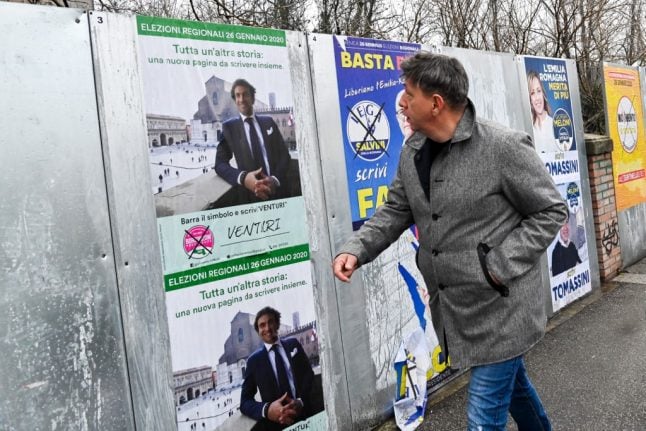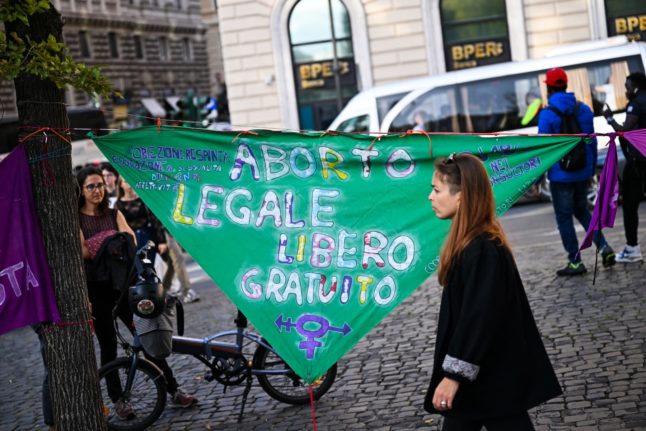The defeat was a major rebuff of Salvini and his nationalist League, which had hoped to score a historic upset and force snap elections in the regional vote in Emilia Romagna, but a high turnout favoured the incumbent centre-left candidate.
The Democratic Party's (PD) Stefano Bonaccini won 51.36 percent of the vote against the anti-immigrant League candidate Lucia Borgonzoni's 43.68 percent, according to official results released by the interior ministry on Monday.
The League's defeat now makes it harder for the party to win other key upcoming regional elections, such as Tuscany and Puglia, where it hopes to sway voters to the right.
READ ALSO: 'Enough hate': Who are the protesting 'Sardines' packing into Italian squares?
The wealthy centre-north region of Emilia Romagna has been a stronghold of the Italian left for over 70 years, but while left-wing values still hold sway in its cities, the right had rallied serious support in towns and the countryside.
Pre-election polls showed the League neck-and-neck with the PD, which governs Italy in coalition with the anti-establishment Five Star Movement (M5S).
Turnout in the key region was almost double at around 67 percent compared with 37 percent in 2014, potentially thanks to the support of the anti-populist youth-driven Sardines movement. Some 3.5 million citizens were eligible to cast ballots to elect the region's president.
In the smaller southern region of Calabria, the candidate of former premier Silvio Berlusconi's Forza Italia, Jole Santelli, won handily with 55.71 percent of the vote.
For months, the League has been hoping for a repeat of its historic win in October in Umbria, which had been a left-wing fiefdom for 50 years. League candidate Borgonzoni, 43, was overshadowed by Salvini, who held daily rallies and inundated social media with snaps of him sampling delicacies in the Parma ham and Parmesan cheese heartland.

League leader Matteo Salvini with centre-right Senator and regional candidate Lucia Borgonzoni during a rally. Photo: Andreas Solaro/AFP
Salvini infuriated the left on Saturday when he broke the pre-election silence — which under Italian law means candidates cannot campaign the day before a vote — by tweeting about the “eviction notice” he was set to deliver to the government.
“Arrogance never pays,” PD candidate Bonaccini said later in his victory speech, scoffing at Salvini's promises to “liberate” the region.
The PD candidate had hoped his track record in the region — which boasts low jobless figures and is home to “Made in Italy” success stories such as Ferrari and Lamborghini — would translate into victory.
He also benefitted from the Sardines movement, which was born in the region just a couple of months ago but has fast become a national symbol of protest against the far right.
Still, analysts said many local family-run, artisanal firms were disgruntled and feeling left behind by the march of globalization.
READ ALSO: Thousands of 'Sardines' rally in Bologna ahead of regional vote

An anti-League protester in Bologna a few days before Sunday's vote. Photo: Andreas Solaro/AFP
The League triumphed in Emilia Romagna at the European Parliament elections in May, becoming the leading party with nearly 34 percent of the votes, topping the PD's 31 percent. Just five years earlier it had taken home a mere five percent, compared to the PD's 53 percent.
On Sunday, voter Andrea Setti told AFP he felt it was even more important than usual for him to cast his ballot, as the region's political “colour”, or allegiance, was no longer clear.
“Now you cannot really know which way it's going to go,” he said.
Fellow voter Lisa Zanarini, 31, said she hoped people would not be seduced by “easy words and easy promises”.
READ ALSO:
- 'Embarrassing conduct': Anger in Italy after Salvini's election doorbell stunt
- More than half of Italians think racist attacks 'can be justified', poll finds
- Explained: An introductory guide to the Italian political system
Editorialist Stefano Polli wrote in La Repubblica that Salvini will have to change his strategy if he hopes to prevail: “Even if the man doesn't seem capable of any other strategy besides rallies and TV talk shows”.
Prime Minister Giuseppe Conte had dismissed fears of a government crisis were Salvini's party to win, saying the election concerned the region alone and had no bearing on national politics.
The coalition's main stabilizing factor is a joint fear of snap elections which would likely hand power to Salvini, whose party is well ahead in national polls. Analysts had warned that a League victory could cause the M5S, which is riven by infighting and has been haemorrhaging members, to collapse.
Contested M5S head Luigi Di Maio resigned Wednesday in a bid to stave off a crisis — but political watchers cautioned it may not be enough.
By AFP's Giovanni Grezzi and Ella Ide



 Please whitelist us to continue reading.
Please whitelist us to continue reading.
Member comments